BURLINGTON, ON March 6, 2012 When your city Council began the process of putting together the budget for the 2012 fiscal year they instructed staff to come back with a document that would result in a tax increase of between 2.5% and 3.50% The draft budget called for a tax increase of 3.44%.
During the past month Council and staff have been going through a process that has resulted in a committee level budget approval calling for a tax increase of 3.29% over the tax increase for 2011 – that one was less than 1%.
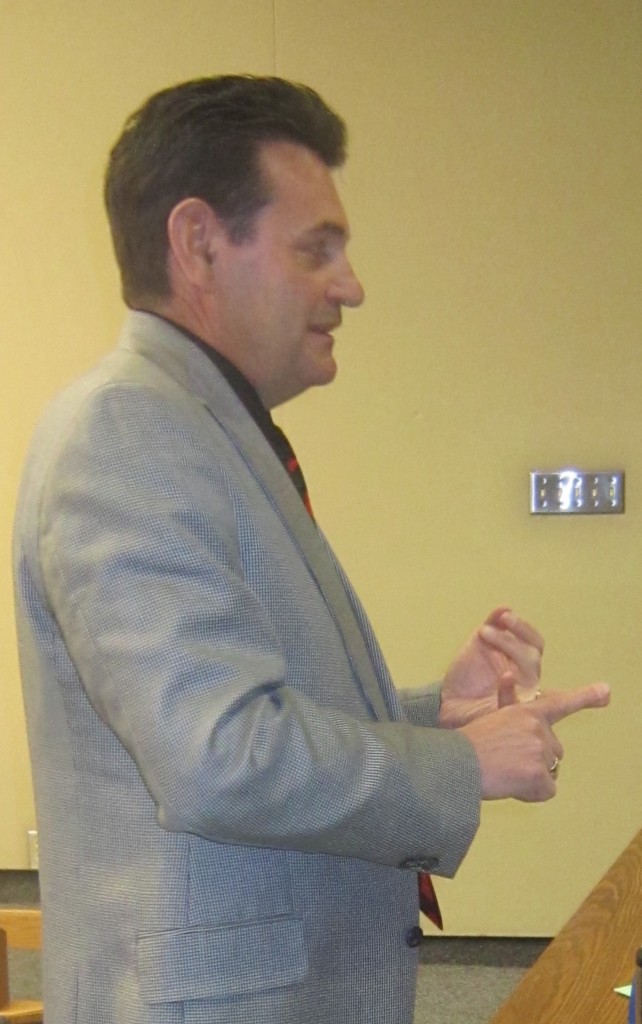
Budget committee meetings were chaired by Councillor Craven who did a superb job of keeping Council members focus and moving through the agenda quickly and efficiently.
What does all this mean to you? You will be adding $16.96 to your tax bill for every $100,000 of current value assessment attached to your home. If your house is assessed at $300,000 your tax bill will have an additional $50.88 cents on it
Mayor Goldring said during his election campaign that he would work to hold the increases during his term of office to not more than 10% during the four year period. During the budget discussions Rick Craven, chair of the budget committee, pointed out the 10% was a political statement and not council policy. With a .9% increase in 2011 and a proposed increase of 3.29 % in 2012, the Mayor will be at 4.19 half way through his mandate.
In 2011 Councillor Sharman wanted to see a 0% tax increase – that demand really shook up Council. The lowest demand we got this year was a 2.99% increase from Councillor Dennison. The 3.29% increase agreed to at Committee will only go higher when it gets to Council for final ratification.
The final figure will get determined at the March 19th Council meeting and the tax bills will go out late in April.
Watching a city craft their budget is a fascinating part of the democratic process. In Burlington it began with the Mayor stating that he would be happy with a tax increase that was somewhere between 2% and 3.5% and city Council sent staff a direction instructing them to pour over every department’s expenses and work towards a figure that fell within that range. Getting to where we are with this budget has been an interesting and at times exasperating process.
Once staff had been given their basic instructions they beavered away over the books. In Burlington, the Capital Budget gets done first – that’s the document that sets out the spending that has to be done over an 10 year time frame and set out what has to be allocated each year. Building a bridge, constructing an underpass, replacing a building. The replacement of the Drury Lane Bridge is an example of a capital expense.
With longer term need set out, Council then buckled down to figure out what they need to get through the next 12 months. In Burlington 90% of the revenue raised through the tax levy is spent on salaries and benefits – so this gets a very close look.
Last year the management of the FTE (Full time employees) was such a mess that Council put a cap on what the city manager could hire. Councillor Rick Craven felt this instruction seriously hobbled the city managers ability to run the city. But hiring had gotten so seriously out of hand the previous two years that Council put the hobble in place. Whenever there is going to be a new hire, the department looking for a new person will have to make a sound business case. Lifting the staffing cap was, in the eyes of Budget Committee chair Rick Craven, the biggest and most important decision made by the committee.
Council had a fine little spat last week when Councillor Taylor said he was opposed to going into closed session to discuss what the staff salary increase would be and if Council did that he was going to leave the Council Chamber and hold a press conference in the atrium.
When Meed Ward was first elected it looked as if she was going to champion a move away from these closed sessions but her desire for higher office proved to be stronger than her journalism degree and for the most part she has been silent when it comes to closed sessions.
Staff had settled on a general salary increase in excess of 2% when they knew that the region had settled on 2%.
Meed Ward did attempt to have the free parking city hall staff get taken away; that didn’t fly and her attempt to have it phased out over three years didn’t get the support of her fellow Councillors either.
Same thing happened to her attempt to have $100,000 removed from the city manager’s Staff Training budget.
Jack Dennison moved back into city hall – that’s going to cost you an additional $15,000. Up until very recently, actually close to the time when council members got moved to the 7th floor, where the accommodation was a lot nicer than the digs they had in offices that were windowless for some council members and their staff were stuck in a basement. Prior to the move to the 7th floor Dennison did most his work out of his health club and didn’t need a full time assistant.
During the part of the process that had Council members digging into very specific spending items Councillor Dennison managed to carve out an additional $600,000 for his Shave and Pave approach to saving the city a bundle and getting our roads to where most taxpayers think they should be.
The city instructed each of the local boards, the Library, the Burlington Art Centre to keep expense increases to not more than 2%, which made it all a little tough for groups like the Sound of Music Festival who came in rather late in the game and asked for an increase that passed the 50% level. He was rebuffed but expect the SOM people to be at Council to try again.
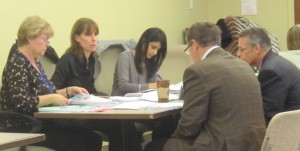
Mayor Goldring hunkers down with staff from the treasury department delving into the specifics behind a particular recommendation in the Capital Budget.
In order to allow Councillors to get some sense of what cuts at different department levels would mean, the financial ninjas in the treasury department produced a spread sheet application that would allow Council members to cut an amount or add amounts and see instantly what the tax implications would be. It was a sort of high tech executive toy they could play with at home at night. When the little electronic memory sticks with the application were handed out Council members stood up and waved the things around like flags. Councillors Meed Ward and Taylor were like children at a birthday party who had just been given a loot bag.
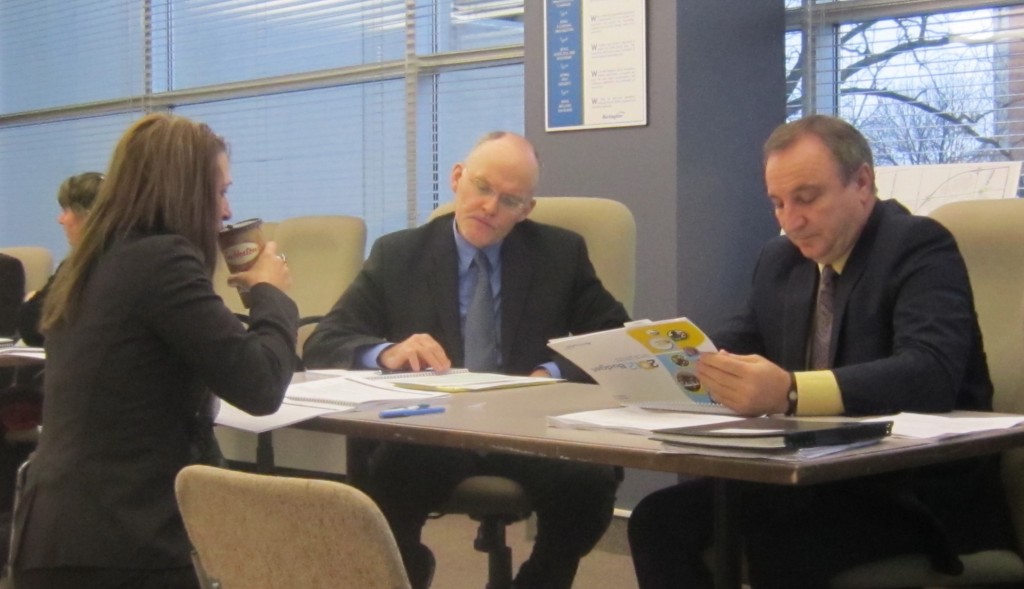
Director of Engineering Tom Eichenbaum looks over a drawing that Councillor Meed Ward needed additional information on. Italo Di Pietro's body language tells where he is with this conversation. He sits to the right quietly looking over Capital Budget numbers.
Sometime after the bound budget projections and recommendations are put in the hands of Council members the staff congregate in a meeting room and gather in groups at different tables where they wait for Council members to sit down with them and ask detailed questions about specific expenditures. Because all the relevant people from a department are on hand Council members get all the information they need and staff get an indication of where a Council member might be going with a particular expense. The room had the feel of a Middle Eastern bazaar where merchants trade with one another.
A couple of weeks later Council members get the Current budget – this is a much bigger book and tends to get more attention from the public, especially groups that want something specific from the city.
For example this year the Burlington Performing Arts Centre was at the public tax trough seeking additional funding that was not in their original budget document.
For each of the budgets, Capital and Current, council members are able to have an item placed on the Agenda of the Budget and Corporate Services Committee. Organizations or individuals that want to delegate on an item can also appear.
Last year, freshman Councillor Marianne Meed Ward took up most of the oxygen in the council chamber with a rather long list of items she wanted to have council discuss and ideally get them to go along with her view and have the staff recommendation changed. While Meed Ward had a number of items on the list this year, it was Councillor Dennison who looked for every possible nook and cranny he could scrounge dollars out of and have re-allocated to the repair of the roads in Burlington. Meed Ward did take a run at reducing the city managers staff training budget by $100,000 but that didn’t fly.
The Fire Department needed and asked for funds to hire additional firemen for the newly opened station # 8 in the Appleby Line Upper Middle Road part of the city. He was told to get by using overtime, which will only work for so long. Men and women asked to take on too much overtime, experience overtime fatigue. Not the kind of problem Fire Chief Shayne Mintz wants to have to deal with. This one may get some additional consideration at the full Council meeting on March 19th.
Transit is going through a transition stage and working through the public participation stage of a consultants report and the creation of a Master Plan. The opportunity to beef up the revenue side by increasing bus fares was lost when Council couldn’t agree on how much and when a rate increase should be implemented. But this one is going to be coming back to Council – maybe even at the full Council meeting March 19th.
The city is short millions on the amount available to repair roads and if you drive the city street you can see and feel the problems with our roads. Dennison has become a champion of the “shave and pave” approach to road repair. If the city maintains a regular schedule of shaving a small portion of the surface of a road and laying down new asphalt the need to re-build a road at some future date, at a significantly higher cost, can be avoided.
The problem for Burlington is that it has not put enough money into the roads repair budget and as a result the city is now years behind in the work that needs to be done. The longer the repair work is left undone the more expensive it gets. Eventually the road has to be rebuilt completely.
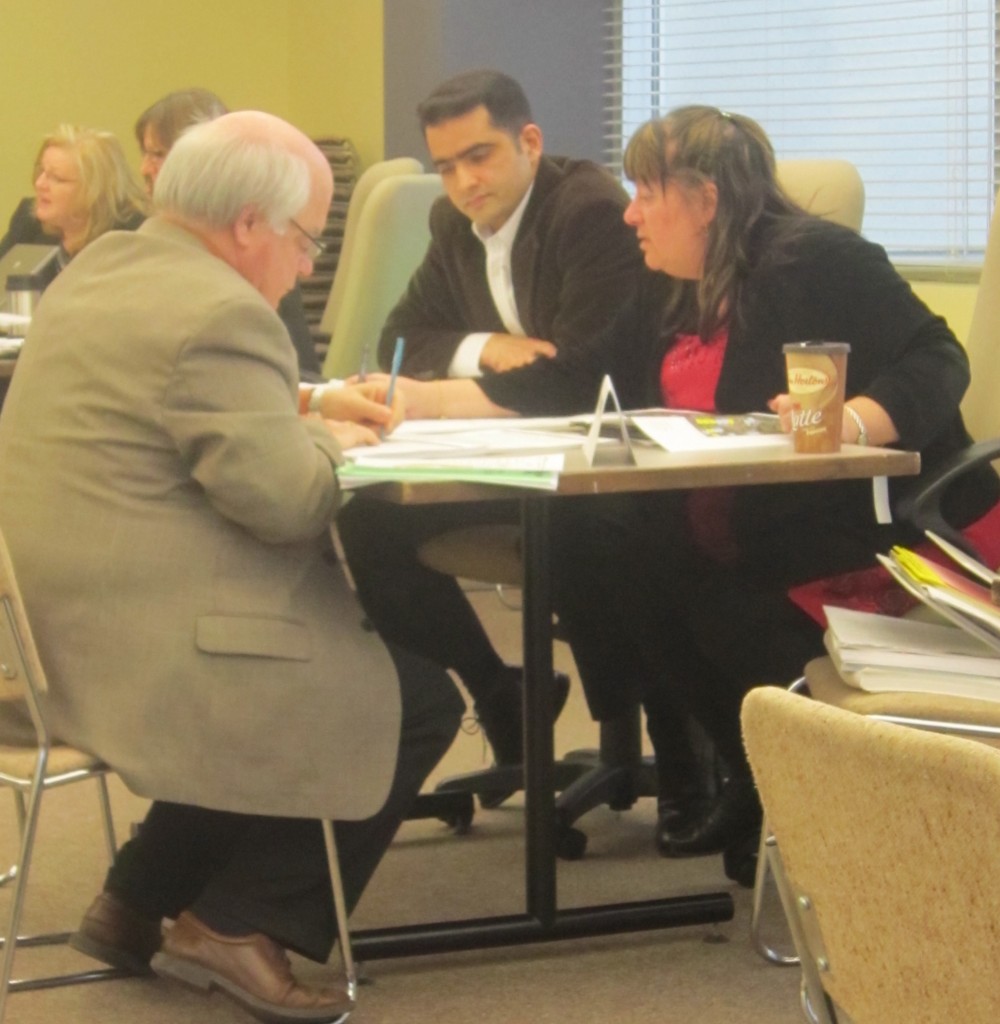
Councillor Taylor has been doing this sort of thing since "the day he used to have hair, it was black then" and knows the numbers as well as anyone in city hall.
If what Dennison is proposing holds through the March 19th Council meeting, where the budget will get cast in stone, there will be enough money to get all the work scheduled for up to the year 2014 done this year. That may sound like we are getting ahead of ourselves – but that’s not the case. We are so far behind that it was going to take years to catch up – which meant years of complaints from tax payers.
Ward 4 Councillor Jack Dennison, who could probably run for Mayor on the strength of what he has done for roads this budget, took the $600,000 staff had recommended for road repairs and dug out more – a total of $600,000 additional dollars for a total of $1.2 million.
Dennison had Budget committee go along with taking the $400,000 that was scheduled for Strategic Land Acquisition and moving it into road repair and replaced that amount with part of the $4 million plus surplus from the 2011 accounts. Dennison was just slicing and dicing and looking for anything that wasn’t nailed down.
As a result the terrible roads condition list will get cleaned out – all done – but Dennison hasn’t stopped. There are funds in the Capital budget which has been approved – like a street that is going to get sidewalks on both sides of the road – Jack wants to cut some of those back to sidewalks on just one side of a road and use the funds saved for road repair. He thinks he can scare up an additional $600,000, for a total of $1.8 million in new money going into road repair.
The “shave and pave” process Dennison has taken on as his personal mission, has a machine that goes along a street and shaves off an inch and a half of asphalt that is immediately replaced by two inches of new asphalt. The result is a road that was beginning to deteriorate is now freshened and good for many years.
Goldring is seen to be doing a fine job as Mayor and has taken a Council that was once very fractious and molded it into a team that pulls together quite well for the most part; however he may find himself having to do even better in 2014. One can almost hear candidate Dennison talking about how good a steward he was of the tax payer’s purse when he not only kept taxes low (he wanted the increase to be 2.99%) but ensured that the money collected was spent on road repair, the city’s biggest problem.














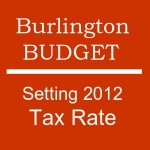

With respect you are missing the point on some Councilors obsession with moving money away from transit for largely unecessary road pavings.
I keep hearing the public wants this stuff (pave and shave) but consulations I go to, the Strat. Plan and Regional Consultations on transportation don’t really support that.